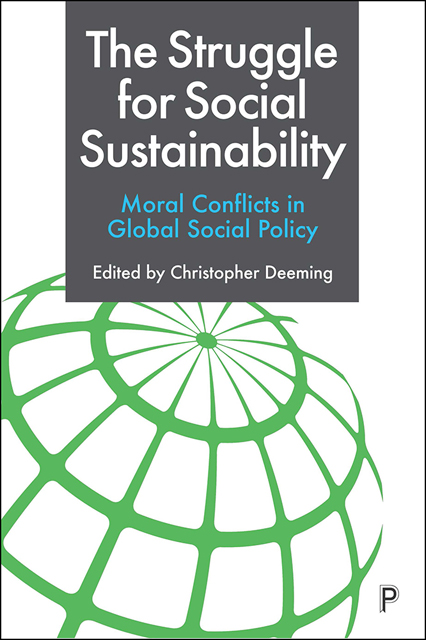Book contents
- Frontmatter
- Contents
- List of boxes, figures and tables
- List of abbreviations
- Notes on contributors
- Acknowledgements
- Preface
- 1 The ‘social’ in the age of sustainability
- 2 ‘No such thing as society’? Neoliberalism and the social
- 3 The social question: reconciling social and economic imperatives in policy
- 4 Disputing the economization and the de- politicization of ‘social’ investment in global social policy
- 5 The social dimension of sustainable development at the UN: from Brundtland to the SDGs
- 6 Paradigm lost? Blocking the path to ecosocial welfare and post- productivism
- 7 World population prospects at the UN: our numbers are not our problem?
- 8 Ageing sustainably
- 9 The political challenges to governing global migration and social welfare
- 10 Bringing in ‘the social’: an intersectional analysis of global crises and welfare
- 11 Global social policy and the quasi- concept of social cohesion
- 12 Putting the global in social justice?
- 13 ‘Go- social’? Inclusive growth and global social governance
- 14 For better or worse?
- 15 The struggle for social sustainability
- Index
1 - The ‘social’ in the age of sustainability
Published online by Cambridge University Press: 14 April 2023
- Frontmatter
- Contents
- List of boxes, figures and tables
- List of abbreviations
- Notes on contributors
- Acknowledgements
- Preface
- 1 The ‘social’ in the age of sustainability
- 2 ‘No such thing as society’? Neoliberalism and the social
- 3 The social question: reconciling social and economic imperatives in policy
- 4 Disputing the economization and the de- politicization of ‘social’ investment in global social policy
- 5 The social dimension of sustainable development at the UN: from Brundtland to the SDGs
- 6 Paradigm lost? Blocking the path to ecosocial welfare and post- productivism
- 7 World population prospects at the UN: our numbers are not our problem?
- 8 Ageing sustainably
- 9 The political challenges to governing global migration and social welfare
- 10 Bringing in ‘the social’: an intersectional analysis of global crises and welfare
- 11 Global social policy and the quasi- concept of social cohesion
- 12 Putting the global in social justice?
- 13 ‘Go- social’? Inclusive growth and global social governance
- 14 For better or worse?
- 15 The struggle for social sustainability
- Index
Summary
Introduction
COVID-19 is a human tragedy, but it has also created a generational opportunity, as UN Secretary-General António Guterres (2020) has observed. An opportunity to build back a more equal and sustainable world. New and emerging socially inclusive models and global policy frameworks are being formulated by policy makers to address the pressing global challenges of the 21st century, such as rising social inequality, extreme poverty and the climate emergency, that focus on important aspects of the social of social policy, are the subject of this volume. This introductory chapter provides a critical introduction to the idea of the ‘social’, and considers how notions of the social are now guiding the development of global social policy for the age of sustainability. The chapter also introduces the different contributions to the evolving debate on the social of social policy and the social dimensions of sustainability that this volume brings together for critical examination and reflection.
Social sustainability
The ‘social’ is now becoming more integrated in global social policy debates around sustainability (Koch and Oksana, 2016; Gough, 2017). Often, however, we find conceptions of the ‘social’ are less than well-defined in ascendant discourses of sustainability (Dillard et al, 2008; Vallance et al, 2011). Certainly, the United Nations 2030 Agenda for Sustainable Development (UNGA, 2015), and the associated 17 Sustainable Development Goals (SDGs, Box 1.1) with their 169 targets adopted by member states of the UN in September 2015, underlines a global commitment to ‘achieving sustainable development in its three dimensions, economic, social and environmental in a balanced and integrated manner’ (UNGA, 2015, 2020; UN, 2019a, 2019b). This is a major achievement, global social policy in the making (Gore, 2015; Fukuda-Parr and Muchhala, 2020). The SDGs are global goals, which build on the experience and successes of the international development goals, the Millennium Development Goals (MDGs, Box 1.1) agreed at the UN Millennium Summit in 2000 (UNGA, 2000), and also the recommendations and targets, eradicate poverty, support full employment, achieve equity, equality and protect human rights, found in the report A Fair Globalization of the World Commission on the Social Dimension of Globalization (WCSDG) (ILO, 2004), and the Copenhagen Declaration on Social Development adopted at the World Summit for Social Development (WSSD) in 1995.
- Type
- Chapter
- Information
- The Struggle for Social SustainabilityMoral Conflicts in Global Social Policy, pp. 1 - 36Publisher: Bristol University PressPrint publication year: 2021



